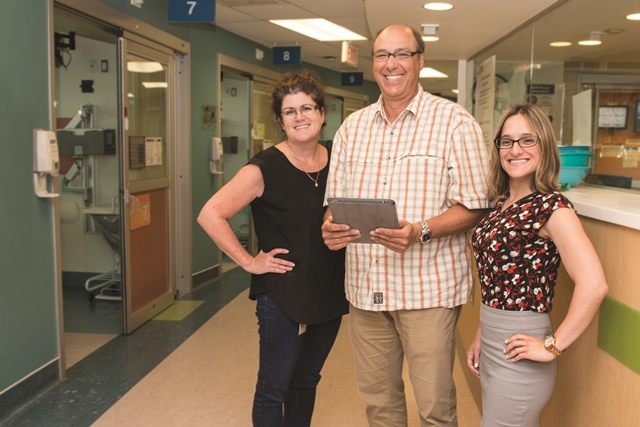
By Mike Foster
A simple questionnaire can help busy emergency physicians accurately assess kids’ mental health needs within minutes, a new study shows.
The HEADS-ED screening tool developed at the Children’s Hospital of Eastern Ontario (CHEO) allows Emergency Room physicians to rapidly assess whether children and youth need immediate intervention or follow-up referrals. Their decisions were found to be as accurate as assessments made by specialized crisis intervention workers, according to a study, “The HEADS-ED: Evaluating the clinical utility of a brief, action-oriented, pediatric mental health screening tool”, published in the May 2017 edition of Pediatric Emergency Care.
Dr. Mario Cappelli, CHEO’s Director of Psychiatric and Mental Health Research, lead author of the study, says: “We’ve shown that emergency physicians can effectively use this tool: it’s as easy and straightforward as a thermometer. More importantly, there’s no difference between how an emergency physician clinically defines levels of need for mental health services compared to a mental health professional.”
The HEADS-ED evidence-based interview tool provides standardized questions and a scale for measuring answers. Results can be easily shared with other health professionals.
For the study, emergency physicians used the screening tool to accurately guide clinical decisions for more than 600 children aged 12 to 18 who presented with symptoms such as anxiety, self-harm, hallucinations, thoughts of suicide, social problems and substance misuse at CHEO’s emergency department between May 2013 and March 2014.
The study is the latest research to emerge from a CHEO-led initiative to improve mental health care for children. In 2009, Dr. Cappelli and his research team, supported by a $500,000 matching fund from the RBC Foundation and the CHEO Foundation, began to look at better ways to improve mental health services for children in the emergency department.
Working with Dr. Roger Zemek, who was Emergency Department physician lead on the HEADS-ED, as well as CHEO team of psychologists, psychiatrists, emergency department physicians, crisis intervention workers, and research associates, Dr. Cappelli created the streamlined tool by adapting core elements of the HEADS, a common memory aid used to obtain the psychosocial history of adolescents. The HEADS-ED adaptation was also based on the Child and Adolescent Needs and Strengths Mental Health 3.0 (CANS-MH 3.0), a 60-item inventory that assists decision-making but typically takes an hour to complete. The HEADS-ED tool (the acronym stands for Home, Education, Activities and peers, Drugs and alcohol, Suicidality, emotions and behaviours and Discharge resources) adds key questions for ED physicians to ask pediatric patients and recommends three levels of action based on responses: a zero for children who require no further action and can return home; a one for those that require follow-up services in future, and a two for immediate action.
Dr. Cappelli says accurate screening means better access to mental health services for children. Pediatric emergency departments across Canada and the US have seen a rise in mental health presentations among children and youth. At CHEO, a tertiary care children’s hospital serving a population of around 1.3 million people, around 3,100 children and youth presented to the ED last year with mental health problems.
“Emergency services are a gateway. Every year, around five per cent of presentations at our emergency department are children with mental health issues. Emergency physicians fix bones but they don’t necessarily have the formal training to deal with certain mental health problems,” Dr. Cappelli says.
Two years ago, the IWK Health Centre in Halifax, Nova Scotia incorporated the HEADS-ED into its procedures for triaging incoming calls from families, children and adolescents with mental health concerns at its Central Referral service.
Sharon Clark, advanced practice leader and a registered psychologist at the IWK Health Centre, says last year the HEADS-ED was used 1,749 times and clinicians have been happy with its impact.
“The HEADS-ED helped us establish a common method of gathering information, documenting that information and then making decisions about the intensity of mental health care required,” says Dr. Clark. “Previously we didn’t have common domains for the intake workers to use as they gathered information. We have been able to simplify our entire process and be far more responsive.”
Mike Foster is a Communications Specialist / Writer for the CHEO Research Institute.

